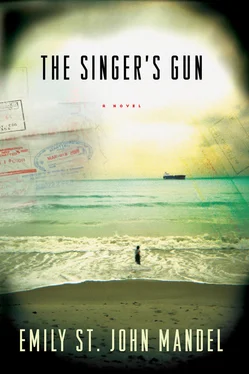“One passport. The rest just want cards, because they’re fucking cheapskates. Anton, seriously, I think you should carry a gun.”
“ What? I’m out of the business anyway. You know this is my last week.”
“For your own protection.”
“Do you carry one?”
“Not on a regular basis,” she said.
“You own a gun. Are you kidding me?”
“We’re gangsters, sweetheart.”
“We’re a gang of two, Aria. You watch too much television.”
“We’re not a gang of two. You know other people work with us on the passport side. Anyway, all I’m saying is, we’re selling an illegal product to illegal people, and things get a little sketchy sometimes. It might not be a bad idea.”
“Illegal people. Illegal people? Did you actually just say that?”
Aria ignored him. She had pulled up behind the warehouse; he got out of the car and followed her around through the side entrance into the shadowy interior, where his father was polishing a bronze sculpture of an angel in a 1920s flapper dress. Aria disappeared into his parents’ apartment in the back.
“Surprised to see you during the day,” his father said. “Doing well?”
“I’m great. Some crazy Bolivian just threatened to shoot me.”
His father whistled softly. “Rough business.”
“Yeah, that’s why I’m getting out.”
His father grunted, but didn’t respond to this.
“Dad, have you ever owned a gun?”
Aria was emerging from the back with a ziplock bag.
“There she is,” his father said.
“Dad? Have you ever owned a gun?”
“Here you go. Five cards,” Aria said, “and one card-passport combo. They’re all scheduled for this week.”
Anton gave up on the gun question. “What times? You know I’m nine to five at the company.”
“Yes, I know you’re nine to five at the company, you poor corporate drone. Here’s your schedule.”
He glanced at it quickly and folded it into his pocket. “So much for my weekend,” he said.
Aria gave him a smoky-eyed glare — every hipster girl in the neighborhood was wearing eye shadow the color of gunpowder that season — and turned away from him. She was furious, and had been for some weeks now. It was in the lines of her shoulders, the angle of her head, the way she leaned with exaggerated calm against the counter to look over the store’s order books, the efficient flick of her pen over a completed delivery.
“You sure have left her hanging,” his father said, without looking up from the bronze. He was buffing a tarnished wrist. The sculpture was half-dark and half-shining from his efforts, like a woman stepping out of shadow. “Walking out on your business partner like that.”
“I don’t want to live like this anymore. I’m sick of doing illegal things.”
“What we do for a living bothers you that much?”
“It has nothing to do with you. It has nothing to do with my family , Christ, haven’t we been over this enough? It’s just me. It’s just me. And another thing,” Anton said, on his way out the door. “I will never carry a fucking gun. Both of you, you hear me? I’m not stooping that low.”
His father didn’t respond to this. Aria was pointedly not looking in his direction. Anton walked out and headed for the subway station. It was the middle of the day and the platform was mostly empty. Alone near a pillar, he glanced at the schedule again and then thumbed quickly through the cards. He opened the passport. It was perfect, as always, and he wondered for the thousandth time how Aria acquired her passport blanks and how the passports came out so perfectly, who else worked on the passport side of the business and whether or not they could be trusted. There were parts of the business that were closed to him and always had been. The girl in the picture stared solemnly back at him. She was pretty, with short blond-brown hair and gray eyes. Elena Caradin James. Place of birth: Canada. Citizenship: United States of America.
Elena Caradin James. Two and a half years later she lay on the floor of his office in a fever, a sheen of sweat on her skin. He touched her, her eyes closed, and he was brought back to that moment on the subway platform with such force that the memory rendered him breathless. He realized suddenly who she reminded him of. A photo of a girl on the front cover of one of his parents’ books. What Work Is : a collection of poems. He read the poetry once and liked it, but he was less taken by the poetry than by the cover: a photograph of a girl of about ten, with Elena’s stillness and Elena’s eyes. She stood between an enormous machine and a factory window, and you could see this in her face: she knew what work was, and she knew she wouldn’t escape it in this lifetime. She was facing the camera, half in shadow. When Anton was ten and eleven and twelve and even fifteen he sometimes took the book down from the shelf just to look at her face.
“It can’t have been an easy business,” Elena said.
“It was an easy business. I was good at it. It was the easiest thing I ever did in my life.”
“Then why did you get out?” She was naked, resplendent in the August heat. A current of warm air moved through the broken window and passed over her skin.
“I don’t know, I just gradually didn’t want to do it anymore.”
“Why not? What changed you?”
“I don’t know. It was gradual.”
“If you could name one thing.”
“Well, there was a girl. Catina. I’d been thinking about getting out, but it was meeting her, it was talking to her. . I didn’t know before her that I was really going to do it. Get out, I mean.”
“A girlfriend?” Elena asked. The recording device in her purse listened silently.
“No, not a girlfriend. I sold her a passport.”
Catina was reading a magazine when Anton came into the café. She looked up and smiled when he said her name, and he caught a glimpse of the page she’d been reading as she closed the magazine — the headline, “Who Was the Falling Man?” and a famous photograph. He’d seen it years earlier, and he recognized it at a glance. The picture was taken on September 11, 2001, at fifteen seconds past nine forty-one A.M.: a man, having jumped from one of the North Tower’s unsurvivable floors above the point of impact, plummets toward the chaos of the plaza below. He is falling headfirst. He will be dead in less than sixty seconds. One knee is bent; otherwise his body is perfectly straight, his arms close against his sides. He is executing a dive that will never be replicated.
“Did they figure out the guy’s name?” Anton asked. Catina looked blankly at him until he gestured at the magazine.
“Oh.” She shook her head. “They thought they knew. But the family wouldn’t concede it.”
“The family doesn’t think it’s him?”
“They don’t want it to be him. The guy in the picture’s jumping before his tower falls, so I guess they see something unheroic about it. They say their son wouldn’t have jumped.”
Anton shrugged. “Doesn’t seem like an unreasonable thing to do,” he said. “I might’ve jumped.”
“I think the falling man’s. . admire-able?”
“Admirable.”
“Admirable.” Catina spoke with a Portuguese accent; she had been in the country for four years now, working as an assistant to a Portuguese businessman, and her English was good but traces of Lisbon remained. “There was no way out, and he made a choice. The air was all flames. On flames?”
“On fire.”
“The air was on fire. He could pause. . no, hesitate. He could hesitate and burn to death, or he could take control in those last few seconds and dive into the air. I like to think I would have done the same thing.”
Читать дальше





![Ричард Деминг - Whistle Past the Graveyard [= Give the Girl a Gun]](/books/412176/richard-deming-whistle-past-the-graveyard-give-t-thumb.webp)






